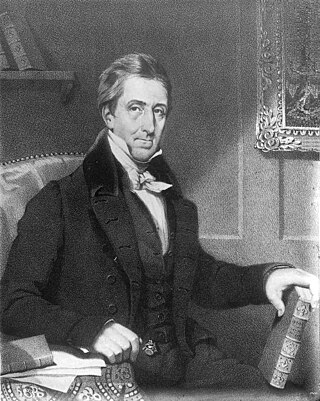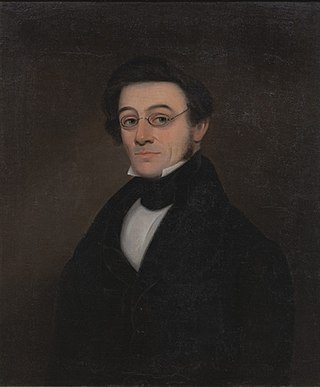
The Province of Canada was a British colony in British North America from 1841 to 1867. Its formation reflected recommendations made by John Lambton, 1st Earl of Durham, in the Report on the Affairs of British North America following the Rebellions of 1837–1838.

Robert Baldwin was an Upper Canadian lawyer and politician who with his political partner Louis-Hippolyte Lafontaine of Lower Canada, led the first responsible government ministry in the Province of Canada. "Responsible Government" marked the province's democratic self-government, without a revolution, although not without violence. This achievement also included the introduction of municipal government, the introduction of a modern legal system and the Canadian jury system, and the abolishing of imprisonment for debt. Baldwin is also noted for feuding with the Orange Order and other fraternal societies. The Lafontaine-Baldwin government enacted the Rebellion Losses Bill to compensate Lower Canadians for damages suffered during the Lower Canada Rebellion of 1837–1838. The passage of the Bill outraged Anglo-Canadian Tories in Montreal, resulting in the burning of the Parliament Buildings in Montreal in 1849.
BC United (BCU), formerly known as the British Columbia Liberal Party, is a provincial political party in British Columbia, Canada. The party has been described as conservative, neoliberal, and being on the centre-right of the left–right political spectrum. The party commonly describes itself as a "free enterprise coalition" and draws support from members of both the federal Liberal and Conservative parties. Since the 1990s, BC United has been the main centre-right opposition to the centre-left New Democratic Party (NDP). Once affiliated with the Liberal Party of Canada, the British Columbia Liberal Party became independent in 1987. The party changed its name to BC United on April 12, 2023.

The 1993 Canadian federal election was held on October 25, 1993, to elect members to the House of Commons of the 35th Parliament of Canada. Considered to be a major political realignment, it was one of the most eventful elections in Canada's history. Two new regionalist parties emerged, finishing second and third in seat count. Most notably, the election marked the worst defeat for a governing party at the federal level and among the worst ever suffered by a governing party in the Western democratic world. In a landslide, the Liberal Party, led by Jean Chrétien, won a majority government.
The Progressive Party of Canada, formally the National Progressive Party, was a federal-level political party in Canada in the 1920s until 1930. It was linked with the provincial United Farmers parties in several provinces, and it spawned the Progressive Party of Saskatchewan, and the Progressive Party of Manitoba, which formed the government of that province. The Progressive Party was part of the farmers' political movement that included federal and provincial Progressive and United Farmers' parties.

The Conservative Party of Canada has gone by a variety of names over the years since Canadian Confederation. Initially known as the "Liberal-Conservative Party", it dropped "Liberal" from its name in 1873, although many of its candidates continued to use this name.
The United Farmers of Ontario (UFO) was an agrarian and populist provincial political party in Ontario, Canada. It was the Ontario provincial branch of the United Farmers movement of the early part of the 20th century.
Joint premiers of the Province of Canada were the prime ministers of the Province of Canada, from the 1841 unification of Upper Canada and Lower Canada until Confederation in 1867.
The Progressive Conservative Party of Manitoba is a centre-right political party in Manitoba, Canada. It is currently the opposition party in the Legislative Assembly of Manitoba, following a defeat in the 2023 provincial election.

John Sandfield Macdonald, was the joint premier of the Province of Canada from 1862 to 1864. He was also the first premier of Ontario from 1867 to 1871, one of the four founding provinces created at Confederation in 1867. He served as both premier and attorney general of Ontario from July 16, 1867, to December 20, 1871.

The Parti bleu was a political group that contested elections in the Eastern section of the Province of Canada. The Blue Party was ideologically located on the political right, and was defined by its support for the Catholic Church, and later for supporting confederation.
The Conservative Party of Quebec was a political party in Quebec, Canada, from 1867 until 1936, when it merged with members of the Action libérale nationale to form the Union Nationale.
The Manitoba Social Credit Party was a political party in the Canadian province of Manitoba. In its early years, it espoused the monetary reform theories of social credit.

Denis-Benjamin Viger was a 19th-century politician, lawyer, and newspaper publisher in Lower Canada, who served as joint premier of the Province of Canada for over two years. A leader in the Patriote movement, he was a strong French-Canadian nationalist, but a social conservative in terms of the seigneurial system and the position of the Catholic church in Lower Canada.

Sir Dominick Daly was a British colonial public servant and administrator during the 19th century, who held positions in British North America, Tobago and South Australia.

The Great Coalition was a grand coalition of political parties that brought an end to political deadlock in the Province of Canada. It existed from May 1864 until Confederation in 1867.

John Solomon Cartwright, was a Canadian businessman, lawyer, judge, farmer and political figure in Kingston, Upper Canada. He was a supporter of the Family Compact, an oligarchic group which had dominated control of the government of Upper Canada through their influence with the British governors. He was also a member of the Compact Tory political group, first in the Legislative Assembly of Upper Canada, and then in the Legislative Assembly of the Province of Canada.

The Politics of British Columbia involves not only the governance of British Columbia, Canada, and the various political factions that have held or vied for legislative power, but also a number of experiments or attempts at political and electoral reform.
Herbert Bertie Anscomb was a Conservative politician and British Columbia cabinet minister.





























